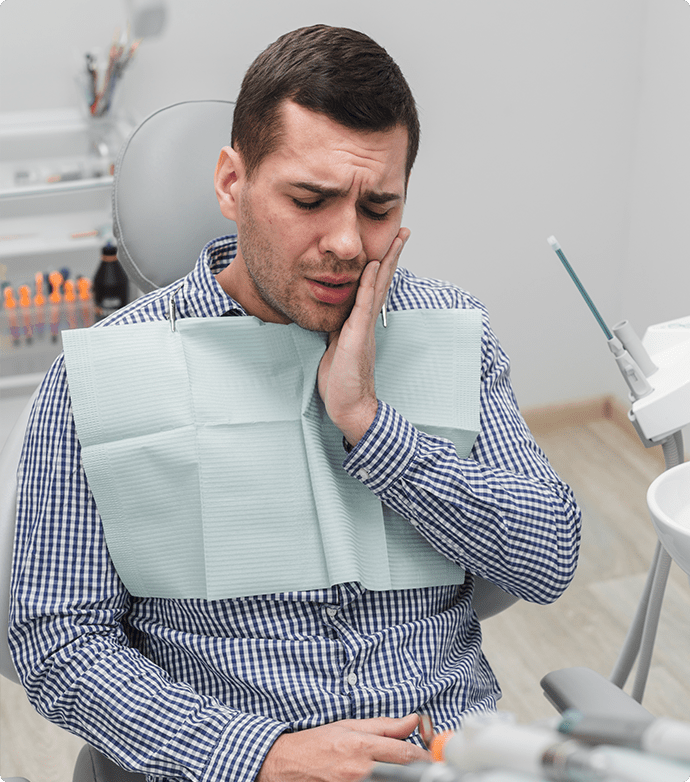
Tooth Extraction in Subiaco
Having a tooth severely damaged or decayed can be painful, and it may have to be extracted. Dental extractions are often the last resort of treatment, and are recommended only when the teeth cannot be restored or saved, or for preventative measures like impacted wisdom teeth extraction. Severe tooth decay, pulp or nerve infection and broken teeth that cannot be treated with root canal, crown or fillings are usually extracted.
At Subi Smilemakers in Subiaco, we use safe techniques to make sure you experience minimal discomfort during your extraction. We will discuss options available to you to replace the extracted tooth.
Visit Subi Smilemakers today to get back in control of your oral health. We always aim to treat the underlying cause of your problem, not just the symptoms.
Don’t let a painful tooth keep you from enjoying life. Get in touch with us today to learn how we can help!
Benefits/Indications of Tooth Extractions
Relieves Pain
Dental pain is a common reason for dental clinic visits, but you don't need to put up with it. Simple problems such as stuck food debris or dental decay can be treated by your dental professional. A tooth that is severely decayed and cannot be root-canal treated/filled, has become loose due to gum disease and/or loss of gum support, or has cracks/fractures extending up to the nerve will need extraction.
Prevents the Damage Caused by an Impacted Wisdom Tooth
An impacted tooth may cause pain and damage to other tooth structures. Our dentist, Dr Deepa, can determine if your unerupted wisdom tooth is impacted or not, and may suggest extraction. Other times, you will feel pain due to the impaction as your wisdom tooth is blocked from coming out, leading to other complications such as infection or inflammation of the gums near their location.
Furthermore, wisdom teeth can be challenging to clean due to their location. Wisdom tooth removal may save you the cost and hassle of more complicated root canal treatments and fillings.
Improves Oral Health
If an infected/broken down or loose tooth is not removed in time, the infection and decay may spread to the adjacent teeth and bone. Having a source of infection in your mouth for a long time adversely impacts your oral health. Hence, timely treatment is essential.
Why You Should Choose Subi Smilemakers in Subiaco for Tooth Extractions
As a family dentist, we are passionate about your teeth and their appearance. All your dental concerns will be handled by our team, from improving your dental hygiene to restoring your teeth and giving you a beautiful smile. We love what we do, and we’ll always treat you with kindness and respect. You can trust us with any dental service because we’re dedicated to ensuring that every patient has a fantastic experience at our clinic!
If you need tooth extractions in Subiaco or anywhere else in Perth, look no further than Subi Smilemakers. We offer treatments that leave our patients smiling from ear to ear after their visit. With years of experience under our belts, we will do our best to ensure that your treatment is completed smoothly, so there are no surprises along the way. All it takes is one appointment with us, and you’ll see why people come back time and again for their dental needs.
Frequently asked questions
How much do tooth extractions cost?
The cost of removing a tooth depends on several factors. A simple extraction would cost less compared to a complex procedure. The following are the average price for tooth extraction.
- Complex Extraction– $388- $475
- Simple Extraction– $200– $300
Factors affecting the cost of extraction
Type of extraction
Simple tooth extractions that use the method of rocking and pulling the teeth at the gumline are less costly. However, a badly broken down tooth or a tooth that is fused to the bone may require dental surgery and other dental tools, so it will cost more to remove.
Profession fee
Your dentist can set their own pricing, though the Australian Dental Association does create guidelines for professional fees in Australia; the fee for wisdom teeth extraction is not regulated. For simple tooth extractions, the dental clinic’s location and the dentist’s expertise may also contribute to the cost of the dental procedure. Also, when a specialist such as a dental surgeon is needed, it would raise the treatment price.
Private dental insurance coverage
Private health insurance covers a range of treatments and is often more comprehensive than most public programs. If you have private coverage, it’s crucial to find out if your dentist will accept the benefits offered by that company before going in for treatment. It will aid in the lowering of out-of-pocket costs.
Do's and don'ts before tooth extraction.
Do’s
Read the pre-op instructions.
Before your surgery, it’s essential to read and follow all the instructions given by the dentist. The preoperative preparation will help minimise discomfort during the procedure.
Plan and purchase your medication.
Your recovery will begin once you have had your surgical extraction. Consequently, you will not be able to go out and buy the medication so make sure to purchase ahead of time or have someone to buy it for you.
Ask someone to drive you.
If you are sedated for the invasive procedure, you will need someone to take you home after surgery. In some cases, you won’t be able to drive yourself and should contact a family member or friend for assistance. However, if no one is available, you may stay in the dentist’s office until it is safe to take a cab.
Wear the proper clothing.
Dress comfortably for your procedure. Do not wear shirts with long sleeves for easy access of your arm when taking your vitals, giving you an IV or monitoring your pressure. Also, avoid clothes that are too tight so you can be comfortable throughout the procedure.
Get a good night’s sleep.
An excellent night’s sleep is always crucial before your procedure. To avoid placing pressure on your mouth, ask your dentist if there are any recommended sleeping positions (if it is relevant to your procedure).
Don’ts
Do not smoke or use tobacco products.
The nicotine in tobacco products slows the healing process, so it’s best not to smoke 12 hours before and 24 hours after treatment. However, if you can, avoid smoking for more than 24 hours after treatment.
Do not eat before the procedure.
You should fast for 12 hours prior to the surgery when the doctor instructs you to. That way, you won’t feel nauseated during and after the procedure. Be sure to inquire about the fasting requirements before receiving a local anaesthetic if you have one. Some simple extractions may just require you not to eat a few hours before the proceure.
What to expect during a tooth extraction
To keep you comfortable during the dental procedure, the dentist or oral surgeon will numb your mouth with a local anesthetic. Patients who have several permanent teeth or impacted teeth extracted might also receive a general anaesthetic to make them sleep during the procedure.
After you’re anesthetized, your teeth will be extracted. You need to bite down on the gauze pad for 30 minutes to an hour to stop the bleeding and create a clot. In certain situations, the wound may be stitched up to close the gum tissue.
What to expect after a tooth extraction
Bleeding
You may experience minor bleeding after oral surgery. It’s not unusual for this to happen, and it’s usually oozing or redness in the saliva.
Your soft tissue or bone may produce localised post extraction bleeding. Trauma from extraction may induce blood vessel damage, resulting in bleeding.
Swelling and inflammation
Following a tooth extraction, you can expect to experience swelling. It’s a typical bodily response that happens as part of the healing process. Minor swelling may occur following a simple tooth extraction, whereas significant swelling is possible with a complex tooth extraction, such as an impacted wisdom tooth removal or the removal of several teeth.
Swelling usually begins in the mouth and spreads to the cheeks, eyes, and sides of the face. The swelling will not be apparent until the following day.
If the inflammation or swelling at the extraction site continues to be severe, you should seek immediate medical attention. There’s a risk of infection in some circumstances, and the symptoms are an unusually high body temperature, yellow or white pus from the extraction site, and persistent severe pain and discomfort.
Dry Socket
The blood clot that forms acts as a protection for the bone and nerves under the empty tooth socket. The clot also serves as the basis for new bone and soft-tissue growth.
A dry socket, also known as alveolar osteitis, can occur when a permanent adult tooth is removed and the blood clot at the extraction site forms incorrectly or dissolves before the inflammation has healed.
When the underlying bone and nerves are exposed, you’ll feel severe discomfort in the socket and on the nerves leading to the side of your face. The pain generally begins one to three days after your tooth is removed, and you develop a dry socket.
Pain
After the numbing agent (anaesthesia) wears off, you may experience pain, especially in the area where the tooth was extracted. Analgesics must be administered as needed to manage pain from complex procedures. Patients who are experiencing discomfort should contact a dentist if it persists or worsens

Ready To Schedule
An Appointment With Us?
We can't wait to help you feel confident about your smile.
Please contact us today!
